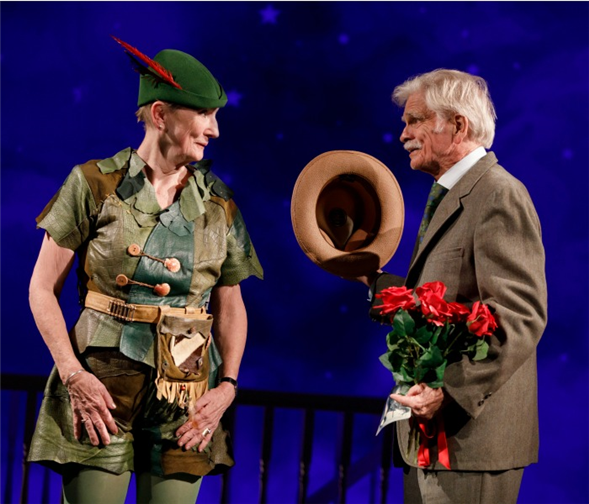Translate Page

How Sarah Ruhl's new play is inspired by her own family history
---
What's the most creative gift you've ever given your mother? For Tony-nominated dramatist Sarah Ruhl that would probably be her play For Peter Pan on her 70th birthday, currently in previews at Playwrights Horizons. Originally penned in honor of her mom's 70th, the show is inspired by Ruhl's own extended family, their disparate perspectives and beliefs, plus that time her mother played the title character in a community theatre production of Peter Pan in Davenport, Iowa.
In prepping the play, Ruhl interviewed her family members, asking each a series of provocative questions including, "Do you pray?" "Do you believe in an afterlife?" And "What is wrong with this country?" "There were no skeletons in the closet, but what was interesting to me was that they all had different ways of getting in," says Ruhl about the methods her relatives used to navigate the choppy waters of dissent without capsizing the family boat. From those conversations and her own imagination, Ruhl drafted a script that she ran by the interviewees for further input -- and their blessing. "It always astonishes me how a family can be so close and yet so different," she says.
Ruhl's play also incorporates some of the metaphor-rich traditions of Japanese Noh theatre, such as iconic scenes, supernatural elements, and a triptych structure. Part one: the adult children of a dying patriarch hold vigil at the hospital. Part two: At home after his passing, they share memories and toast their father, whose ghost shuffles about the stage. Part three: They all go to Neverland, led by the sibling with the most playful spirit. "Noh drama has it so right," Ruhl says. "Theatre is the proper place for ghosts."
{Image1}
Themes of youth, aging, death, and family echo throughout the play, which is both painfully realistic and utterly fanciful. Those subjects resonate for the actors, too, most of whom have been with the show since its earliest workshop plus out-of-town productions at the Humana Festival of New American Plays and Berkeley Repertory Theatre.
"We talked about those things a lot," says Kathleen Chalfant who plays Ann, the character based on the playwright's mother, Kathleen Kehoe Ruhl. "We talked about being adult orphans because, in many ways, I think that's what the play is about, when suddenly you're at the top of the pyramid -- or against the barricades, depending on your outlook."
That idea of when, exactly, a person becomes an adult is explored throughout the play, and it's something Ruhl has thought a lot about in real life. "I became an adult when I had children because you're putting other people's needs above your own," she says. "It's a loss of a certain kind of narcissism, and an acknowledgement that the world is bigger than your own desires."
But even as Ruhl -- and all of us -- face the inevitable onset of adulthood and aging, a bit of childlike wonder should always remain. "This play is profound but it also wears more cheerful clothes," says Chalfant, referring to the play's Neverland-set climax. "There's a wonderful gasp of delight when the curtain opens and you're in the nursery, and when I put the whole Peter Pan outfit on."
"I think in some ways Neverland is the theatre," Ruhl adds. "Growing up and seeing the pictures of my mother dressed as Peter Pan, I associated that so much with the theatre itself. Only in play can we express certain primal impulses. That's one loss that people have when they grow up, that they can't play anymore. That's something my mom never lost. And it made my childhood kind of magical."
---
Follow Frank Rizzo at @ShowRiz. Follow TDF at @TDFNYC.
TDF MEMBERS: Go here to browse our latest discounts for dance, theatre, and concerts.
Top image: Kathleen Chalfant and Ron Crawford. Photos by Joan Marcus.